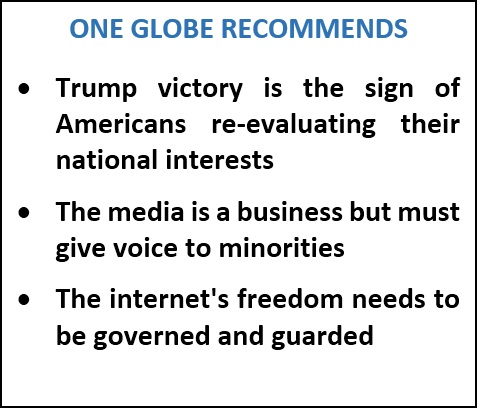Media, Social Media, and Trump
Posted by Admin on January 12, 2018
 |
Invited to speak at the 2017 One Globe Forum on ‘Media, Social Media, and Trump’, Mr. Manish Tewari, former Union Minister for Information & Broadcasting, began by saying that he believed Donald Trump to be a standalone subject.
Mr. Tewari remarked on how Trump had defied every prediction which wrote him off during the elections. But, when the numbers came in, everybody, especially the mainstream media in the USA, “had to eat crow.”
The mainstream media, with its extensive coverage of Trump and his tactics, portrayed him as the obvious antithesis of all the values that the US, as a nation state, stands for. But, Mr. Tewari made an interesting point. According to him, Trump’s victory represents the re-emergence of the Jacksonian school of political thought, as opposed to the Wilsonian and others. He said that for the masses, this election is the triumph of a tradition which believes in putting American national interests first.
Over the last two decades, the USA’s engagements with Iraq and Afghanistan, its huge investment of resources and human lives, have made Americans question where their national interests truly lie. Mr. Tewari said that there have been NATO sceptics in the United States for a very long time – people who believe that it is time that Europe started paying for its own security, and that the United States should no longer underwrite the NATO project. Understanding this shift is what helped Trump while the media agonized over his campaign.
About the media, Mr. Tewari said, “All of us tend to ignore one reality that the media is not a philanthropic exercise. The media is a business like any other business. It’s got its bottom lines, it’s got its shareholders, it’s got its employees. And therefore, there is a backend which really drives a lot of the front-end of the media.”
As an example, he cited the Indian context. In 1991, India had one TV channel. By 2017, the number had expanded to 850. Today, there are 170 million TV homes in India, which have access to cable, satellite and TV. Out of these 850 channels, approximately 400 are news and current affairs channels. But, their total share of the viewers is only 7%, as approximately 93% Indians don’t watch the news.
Given that the TV & media is a business, sensationalism, and other eyeball-grabbing tactics become necessary for news channels. These realities, Mr. Tiwari suggested, can be extrapolated to media landscapes in almost every democratic country.
However, Mr. Tewari acknowledged that the US media campaigned for what it believed were core American values, even if they were out of sync with the country’s thought. “Because, at times, or invariably, democracy is not about listening to the voice of the majority. Democracy is about giving the creative minority, the values on which a nation state is constituted, a fundamental chance to be out there in the public discourse.”
This multiplicity of voices has been facilitated by social and new media. Discourse no longer has a unidirectional flow. Social media has fundamentally levelled the playing field, thanks to the internet – “the most audacious experiment in anarchy.” And it has succeeded – for the first time in human history, power resides concurrently on so many fingertips. This makes the internet the largest ungoverned space on the planet with the number of internet users exceeding the population of China.
The future, however, is unpredictable. As the world has seen the rise of the internet over the last two decades, it could also witness the demise or “balkanization of the internet, along hegemonistic domains, along value systems, along civilizational reach.” Because, it is nation-states which control the hardware of the internet – licensing of gateways, routers, and so on. He added, “China is the most successful example of turning the internet into the intranet. It’s another matter that they’re not able to stop a million mutinies which take place every day in the virtual space.”
If Trump emulates China’s example, and bans Muslim countries from accessing American sites, it is possible that the world will be left with an Anglo-Saxon internet. Donald Trump’s victory has implications far, far beyond our collective imagination. Therefore, the next couple of months are bound to be interesting.
As Mr. Tewari summed up, “The United States, [the] largest outside balancer of power . . . is redefining itself. And there is going to be cost and pain to many people once that redefinition plays itself out.” In the meanwhile, we all need to “grab on to our seats.”








